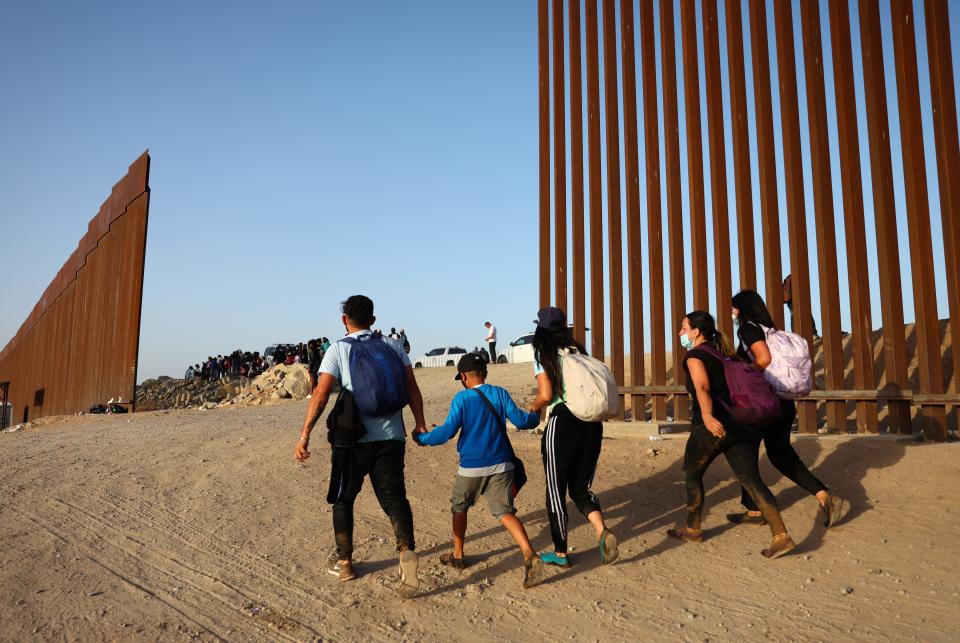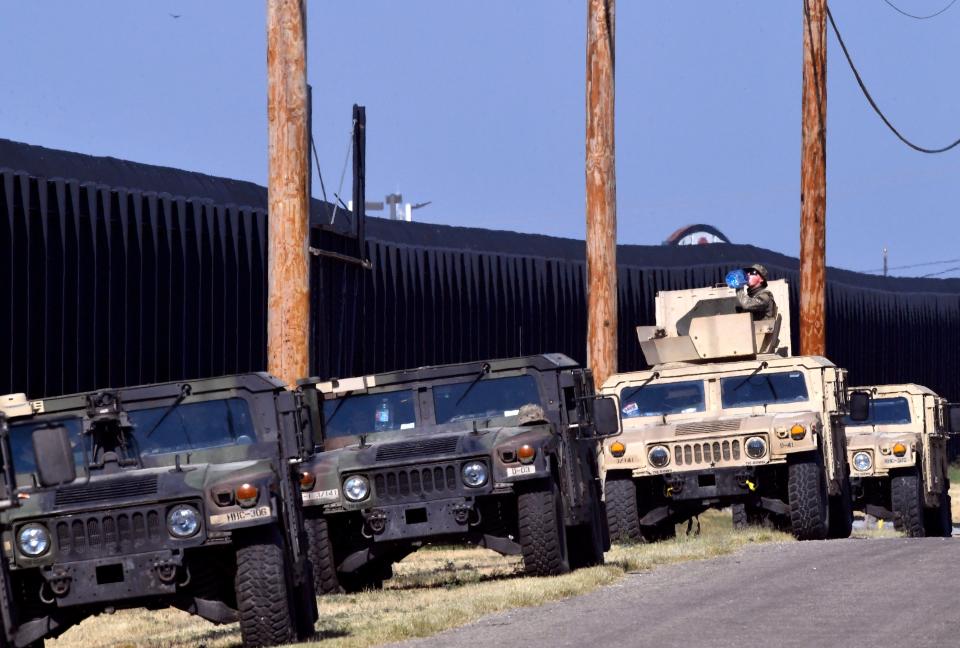Vigilantes along US-Mexico border? Texas bills would shift border patrol to state hands
- Oops!Something went wrong.Please try again later.
- Oops!Something went wrong.Please try again later.
“Border Protection Units” prowling the U.S.-Mexico border and arresting asylum-seekers. A state “Border Protection Court” designed to prosecute them. Third-degree felonies for those convicted of crossing without proper documentation.
A pair of proposed bills under review by the Texas Legislature would essentially shift U.S. immigration duties in the Lone Star State from federal to state hands. One of them, House Bill 20, proposes creating roving police units consisting, in part, of "law-abiding citizens" – raising the specter of armed vigilantes confronting asylum-seekers at the border.
The bills are expected to pass the Republican-controlled Legislature. They could test the boundaries for states enforcing immigration rules, which the Constitution assigns to the federal government.

But state Attorney General Ken Paxton has said he welcomes a chance to test that ruling in front of the new, more conservative makeup of the Supreme Court.
"It is really dangerous," said Bob Libal, an Austin-based consultant for Human Rights Watch. "What is being proposed is almost certainly going to result in more abuse of migrants and others at the border."
More: Rescues of asylum-seekers soar as Border Patrol ramps up efforts and more migrants arrive
What is being proposed?
HB 20, authored by state Rep. Matt Schaefer, R-Tyler, would create "Border Protection Units," overseen by a governor-appointed chief, to "arrest, detain and deter" asylum-seekers entering the U.S. without documentation. The chief could hire "law-abiding citizens" with no law enforcement experience, as long as they don't have a felony conviction, according to the bill. It also calls for a $10,000 fine for those caught crossing and raising the offense to a third-degree felony from a misdemeanor, as it currently is under federal law.
Another proposal, House Bill 7, introduced by state Rep. Ryan Guillen, R-Rio Grande City, would create a parallel court system to try migrants and smugglers picked up by the state-run patrols. It also endorses raising a mix of public and private funds to run the court and continue building a barrier along Texas' border with Mexico.
Guillen and Schaefer did not return requests for comment.
More: Grandmothers, grandchildren separated at border, despite U.S. move to reunite migrant families
Why are they being proposed?
State leaders point to the recent influx of asylum-seekers at the Southwest border as the impetus for state-run enforcement. In last fiscal year that ended in September, border officials encountered 2.4 million migrants – a record high – though thousands of them were repeat crossers, or asylum-seekers who were returned to Mexico under Title 42 and other initiatives and attempted to reenter the United States, according to federal statistics.
In 2021, Gov. Greg Abbott launched Operation Lone Star, which deployed state troopers and members of the National Guard to the border to repel and arrest migrants crossing into the U.S. without permission.
Abbott has touted the initiative as successful in stopping smugglers and drugs from slipping into the U.S., but it's also been steeped in controversy. Immigrant attorneys have alleged racial profiling in border communities and due-process violations.

HB 7 and HB 20 would codify Operation Lone Star into law, said Priscilla Olivarez, policy attorney and strategist with the Immigrant Legal Resource Center. The proposed laws' shortcomings – alleged racial profiling and encroachment of due process rights – would expand to U.S. citizens and longtime undocumented border residents, she said.
"These groups would have the power to racially profile," Olivarez said. "And they would have the power to do this in a way that would be unchecked."
If passed, how would these bills spark a Constitutional battle?
Republican leaders in Texas have said they wish to contest a 2012 U.S. Supreme Court decision that struck down key provisions of an Arizona law that allowed local law enforcement to arrest undocumented immigrants and charge them with state crimes.
In a border security committee hearing last month, Texas Attorney General Ken Paxton said he would like to see cases that "test" the ruling in Arizona v. United States. Bills such as HB 7 and HB 20 would be seen as ideal test cases, if they're challenged in court, as expected.
"We have a different court," Paxton told state lawmakers, referring to the Supreme Court's 6-3 conservative majority solidified by three appointments under President Donald Trump. "We have the best chance we’ve ever had to overturn (Arizona v. United States) and give the state the ability to protect its citizens."
But unlike the court's decision last year to overturn Roe v. Wade, the landmark abortion protection decision, reversing the federal government's purview over immigration enforcement could be a tougher sell for justices, said Denise Gilman, co-director of the Immigration Clinic at the University of Texas at Austin Law School.
"We don’t really want every single state having its own immigration policy," Gilman said. "I’m not sure even this court will be willing to undo the longstanding understanding of immigration as a federal, not a state, function."
Special report: Inside the dire situation facing migrants bused across U.S.
Follow Jervis on Twitter: @MrRJervis.
This article originally appeared on USA TODAY: Two Texas bills could test boundaries of states enforcing immigration

